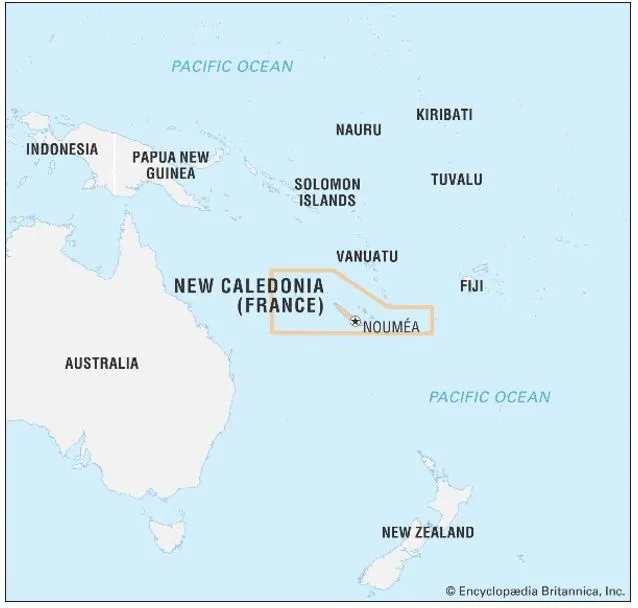

19th May 2025 (13 Topics)
Context
New Caledonia is a French territory in the South Pacific with a long-standing independence movement led by its Indigenous Kanak population. Tensions have resurfaced in 2024 after failed negotiations over its political future and voting rights reforms.
Where and what is New Caledonia?
- New Caledonia is a small group of islands in the southwest Pacific Ocean, around 1,200 km east of Australia.
- It is a French overseas territory with a population of about 271,000.
- While geographically part of Melanesia, it has been under French rule since 1853.
- Even today, it remains politically tied to France, but the question of whether it should remain a part of France or become independent has been a deeply emotional and political issue — especially for the Indigenous Kanak people, who have long demanded sovereignty.
- Roots of the Conflict
- France colonised the islands as a penal colony. The Kanak people were dispossessed of their land, culture, and political autonomy.
- Over time, especially during the 20th century, the Kanak movement for self-rule gained strength. It took a violent turn in the 1980s when civil conflict broke out between Kanak pro-independence groups and loyalists (those who wanted to stay with France).
- This tension led to the 1988 Matignon Accords and later to the 1998 Nouméa Accord — a turning point in the political journey of New Caledonia.

What was the Nouméa Accord (1998)?
- The Nouméa Accord recognised the colonial trauma of the Kanak people and aimed to provide them with greater autonomy.
- It created a unique political arrangement — a “sui generis” status:
- A local Congress with legislative powers
- Restricted voting rights to long-term residents (to protect Kanak political strength)
- Own citizenship status (New Caledonian)
- Most importantly, it agreed on three referendums on independence, to be held from 2018 to 2021.
- Results of the Referendums:
- 2018 – Independence rejected (57% No)
- 2020 – Rejected again (53% No)
- 2021 – Overwhelming rejection (96% No) — BUT this was boycotted by the Kanak leaders, who were mourning during the COVID pandemic and asked for postponement, which was denied by France.
- So, although all three technically rejected independence, the legitimacy of the third vote is heavily disputed.
Why is independence still demanded?
- The Kanak and Socialist National Liberation Front (FLNKS) and other pro-independence groups believe:
- The political and economic system remains unequal, dominated by French settlers and loyalists.
- Kanaks face higher unemployment, poorer education and health indicators.
- Despite autonomy, key functions like defence, foreign policy, judiciary and currency are still under Paris’ control.
- The cultural identity of Kanaks, their land rights, and future as a people feel insecure within the French system.
- Thus, for many Kanaks, independence is not just a political goal but a way to reclaim identity, dignity, and full self-governance.
- Recent political crisis in 2024? After the disputed 2021 referendum, no clear political roadmap was agreed upon. Tensions simmered. In 2024, France proposed to “unfreeze” the electoral rolls — meaning more recent French migrants to the islands would be allowed to vote in future provincial elections.
- In this charged atmosphere, France tried to mediate a new “middle path” — known as “sovereignty in partnership.”
What is “Sovereignty in Partnership” and Why Did Talks Fail?
- The French proposal offered:
- Broad internal autonomy for New Caledonia
- Control over local governance, judicial matters, and international representation
- BUT with key powers delegated back to France under mutual agreement
- This was meant to offer symbolic sovereignty without total separation — a model used in places like the Cook Islands (with New Zealand) or the Faroe Islands (with Denmark).
- But the plan collapsed due to rejection by hardline loyalist factions.
- In contrast, some loyalists proposed partitioning New Caledonia, with:
- The Kanak-dominated North and Loyalty Islands becoming autonomous
- The wealthier, French-dominated South staying with France
- This was rejected by the French government (which wants New Caledonia to remain united) and outright condemned by the Kanak side as an idea “akin to apartheid.”

